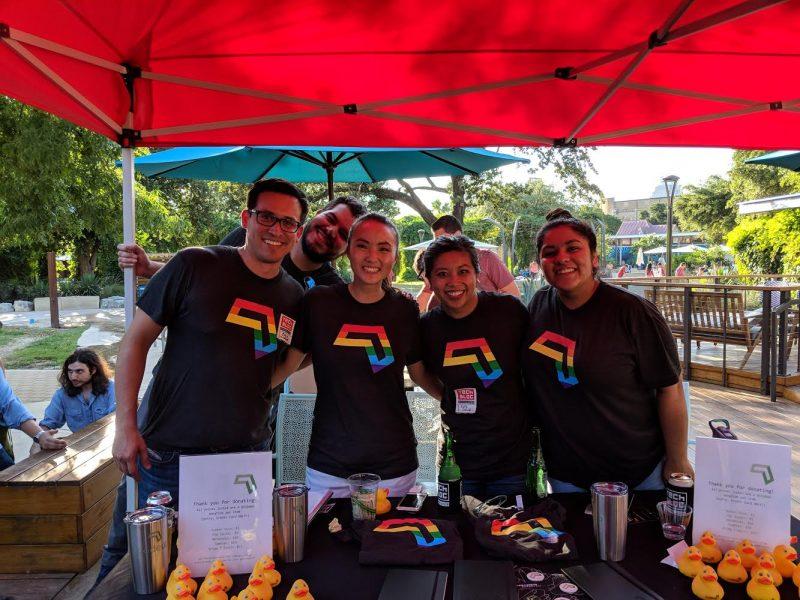Some Trinity students spent their summer working on summer projects through academic research or partnerships with local San Antonio organizations. In doing so, many students achieved accomplishments that could inform and guide their future work.
Trinity’s Arts, Letters and Enterprise program (ALE) gives students the opportunity to live on campus and partner with different organizations such as Gemini Ink, the Green Spaces Alliance of South Texas and the Esperanza Peace & Justice Center for a paid three-month internship.
Senior Megan Smith’s favorite part of her ALE internship with the Green Spaces Alliance — a nonprofit focused on environmental sustainability — was her work with the lake conservation program. Smith and colleagues visited properties to make sure landowners complied with their conservation easements, agreements that they had made with GSA pledging not to develop a plot of land.
“I went on two or three of those visits, and I love the outdoors, and I love hiking, and basically we were just hiking and getting paid to do it,” Smith said.
Smith decided that nonprofit work may not be for her. However, she is considering a career in land management.
“[Land management] involves the ‘hiking for [a] living’ type thing and you’re really the boots on the ground — talking to landowners, observing their properties, making sure that things are being taken care of and networking with people,” Smith said.
For students interested in entrepreneurship, Students + Startups is one of two summer programs at Trinity that the entrepreneurship department sponsors. S+S, expanding nationwide this fall, gives students the opportunity to partner with San Antonio startups.
Senior Caroline Haggard partnered with Jungle Disk, a local cybersecurity startup. Haggard helped to build a chatbot, a computer program that can converse with potential customers to deliver information.
“My absolute dream job is software development for video games, and so being able to participate in the software development for a chatbot has been a lot of fun,” Haggard said. “Being in an environment where there are multiple people working on the same project really helps give the feeling of what it would be like to be on a development team.”
The other entrepreneurship program, Summer Accelerator, allows students to work on their own companies over the summer. Summer Accelerator is a special program for Stumberg Prize finalists, in which these students can spend the summer developing their companies further with assistance from the entrepreneurship department. Luis Martinez, director of Trinity’s Center for Innovation and Entrepreneurship, explained the benefits of these programs for students.
“To be working full time for 10 weeks on starting your own company or working with a local startup is an incredibly valuable experience,” Martinez said. “[These programs] give students experience in their major and direct experience that they can then put on their resume or that could actually be utilized to further the rest of their career.”
Students were also busy conducting research with faculty members this summer.
Brandon Guzman, a senior and McNair scholar, analyzed Twitter data from Maryland’s summer gubernatorial election with Jennifer Jacobs Henderson, professor and chair of the communication department. Their research focused on the behavior of bots trying to influence the outcome of the election.
Guzman spoke about how he stayed motivated during his research project.
“I think what kept me going at the end of the day is that all of this has a purpose and all of this matters,” Guzman said. “This is going to make a difference regardless if I’m making some groundbreaking discovery or if I’m simply just building the next step so someone can take another step further, you know?”
Junior Simone Washington also worked with Henderson on a Mellon Initiative research project. Washington helped write a chapter for Henderson’s upcoming TU Press book, “Maverick Rights: Mayor Maury Maverick and Free Speech in Wartime San Antonio”. Each chapter of the book focuses on a different demographic in 1930–40s San Antonio.
“Last summer Hunter Sosby worked on the communist perspective, Dr. Henderson’s working on the Jehovah Witnesses, and I’m working kind of on the black perspective,” Washington said. “Each of us is trying to determine whether Maury helped or hindered free speech in San Antonio, specifically in regards to these groups.”
These four students and their fellow interns and researchers presented their findings at the 2018 Summer Research Symposium on July 23 and 25. The first day of the symposium spotlighted posters, while the second day included oral presentations about research students’ findings.
Students interested in learning more about summer research or internships can contact [email protected], [email protected] or [email protected].














Parker • Aug 17, 2018 at 6:56 am
Hello Admin,
It is very nice that your blog is providing information regarding the program. I want to aware you towards the “NPR Full-Time Internships 2018”. These programs are open to support your academic studies and test your interest in a particular career.
Application Deadline is Varies
For more information you can go through –
https://www.biginternships.com/npr-full-time-internships/